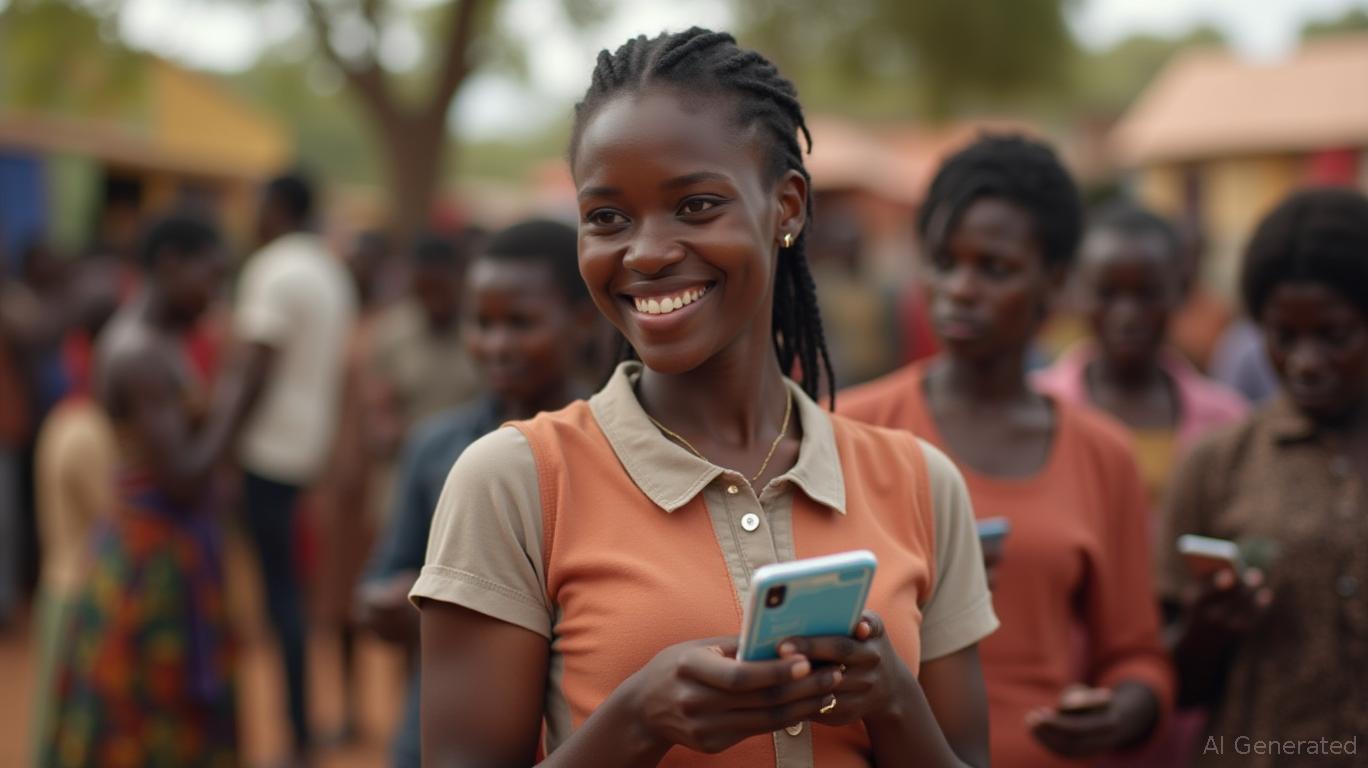Smartphones Become Essential: M-KOPA Reaches 1 Million Users in Uganda, Tackling Financial Barriers
- M-KOPA reaches 1 million Ugandan customers via 7,484 DSRs, expanding digital inclusion through pay-as-you-go smartphones and loans. - The platform's "More than a Phone" initiative bundles financial tools, targeting 173,000+ users with loans, insurance, and mobile data in rural/urban areas. - With 83% of Ugandan DSRs under 35, M-KOPA aims to scale to 10 million smartphones by 2027, positioning devices as lifelines against financial exclusion across five African nations.
M-KOPA, a fintech firm based in the UK, has reached a major milestone in Uganda by serving its one millionth customer in the country. This accomplishment, made possible through the efforts of 7,484 direct sales representatives (DSRs), highlights the company's dedication to promoting digital and financial access throughout Africa. Announced in a LinkedIn update on November 4, 2025, this achievement represents a crucial advancement in M-KOPA’s mission to reach underserved populations with affordable smartphone financing and digital financial products, according to a
M-KOPA’s progress in Uganda is part of its larger goal to reduce the digital gap across Africa. Utilizing a pay-as-you-go approach, the company offers smartphones, solar energy solutions, and other vital technologies to households with low and moderate incomes. In Uganda, 83% of the DSRs are under the age of 35, demonstrating the company’s commitment to empowering young people to promote technology adoption in both rural and urban communities. Sales representatives such as Emmanuel Habyarimana, who has enrolled over 3,000 clients, and Elisezi Ndugala, a leading agent with nine years of experience, illustrate the local impact of M-KOPA’s strategy, the report highlights.

In addition to selling smartphones, M-KOPA has broadened its services to include digital lending, now providing financial products to over 173,000 users. Through its Smart Money Platform, customers can access loans to help manage their finances, strengthen their economic stability, and support small business growth. The platform also offers health insurance, mobile data, and device protection, turning smartphones into versatile tools for economic advancement. In Uganda, the introduction of the "More than a Phone" campaign further enriches this ecosystem by integrating features like digital loans and health coverage into a single device, as detailed in the report.
M-KOPA’s expansion in Uganda is part of its wider growth across Africa. The company is active in five countries—Kenya, Uganda, Nigeria, Ghana, and South Africa—and has set bold objectives for 2025 and beyond. It plans to exceed $500 million in yearly revenue by the end of the year and ramp up smartphone production to 10 million units by 2027. Company leaders have stressed that smartphones are not just tools for communication, but essential resources for overcoming financial exclusion, especially in rural regions, the report notes.
This achievement demonstrates M-KOPA’s capacity to respond to market demands while using technology to create positive social change. As the company continues to grow, its business model may become a reference point for other fintech organizations aiming to tackle Africa’s distinct financial inclusion issues.
Disclaimer: The content of this article solely reflects the author's opinion and does not represent the platform in any capacity. This article is not intended to serve as a reference for making investment decisions.
You may also like
Solana News Today: "While Zcash Surges, Ghostware Quietly Advances Scalable Solutions on Solana"
- Privacy-focused crypto tokens like $GHOST and $EYE gain traction amid market volatility, driven by demand for verifiable infrastructure and scalable solutions. - A major whale's $16.7M investment in $GHOST and GhostwareOS's Solana-based privacy modules highlight growing institutional confidence in the ecosystem. - Solana ETFs attract $421M in inflows, contrasting broader crypto outflows, while $EYE's renewable energy-AI hybrid model offers tangible asset-backed returns. - Zcash's 1,000% surge underscores

BNB News Today: Apriori Suffers 80% Token Loss, Raising Concerns Over Crypto Airdrop Security and Trust
- Apriori's BNB Chain airdrop lost 80% of tokens to a Sybil group via 5,800 interconnected wallets funded by 13 addresses. - The attack exploited pre-announcement timing and empty wallets, undermining trust in the project's fair distribution claims. - APR token price fell over 60% post-incident, mirroring similar Sybil exploits at MYX Finance and zkSync that siphoned millions. - Experts demand stronger anti-fraud measures like multi-factor checks as BNB Chain faces scrutiny over recent security lapses.

Pfizer Files Lawsuit Against Novo: Alleges Competitor Engaged in Antitrust Scheme to Dominate Obesity Market
- Pfizer sues Novo Nordisk and Metsera in Delaware courts, alleging anticompetitive tactics to block its $7.2B obesity drug acquisition. - Novo's $8.5B superior bid for Metsera's GLP-1 pipeline—valued at $5B peak sales—triggers legal claims over regulatory bypass and contract violations. - Pfizer leverages early FTC approval for its deal, seeking court orders to force a November 13 shareholder vote amid patent expiration threats. - The dispute highlights $150B obesity market stakes, with Novo defending its

Hidden Leverage and External Party Risks Lead to XUSD Downfall
- Stream Finance's XUSD stablecoin collapsed to $0.30, freezing $160M in user funds after a $93M loss linked to an external fund manager. - The crisis followed a $100M exploit at Balancer Protocol, amplifying DeFi market anxiety and triggering rapid fund withdrawals. - Stream's high-leverage model and hidden $520M TVL vs. $160M actual deposits raised red flags about risky third-party fund usage. - XUSD's collapse exposed DeFi vulnerabilities, reigniting debates on third-party risks and urging audits for pr
